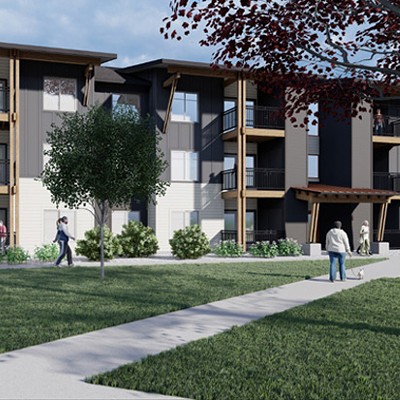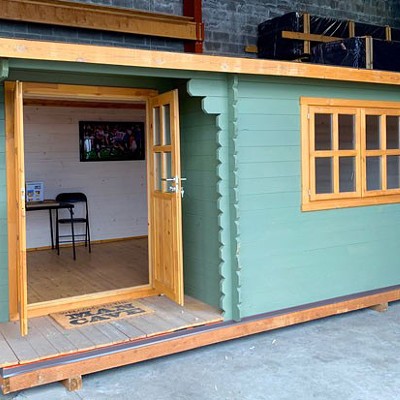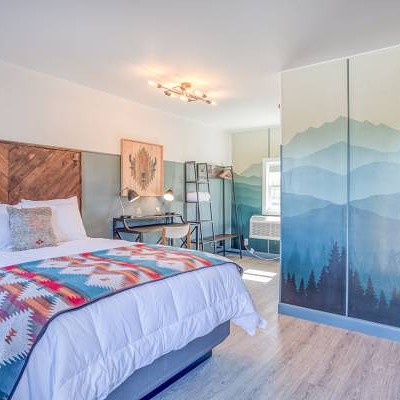City Council recently took another step toward addressing Bend's affordable housing crisis when it approved the sale of City land to a local affordable housing developer. But despite the high demand for such units, this action is unlikely to bring relief to a nearly impenetrable rental market for at least a couple more years.
At the Dec. 2 Bend City Council meeting, the council voted and approved the sale of a five-acre parcel of land on Butler Market Road to Pacific Crest Affordable Housing, a Bend-based affordable housing developer. Pacific Crest's proposed project for the area includes 64 units and it's the builder's first development that will be available to anyone at or below 60 percent of the area's median income.
Pacific Crest's John Gilbert and Rob Roy have passed a significant checkpoint, but many steps remain in what is typically a five-year process to get from conception to completion.
"So the steps are to find a site, to design the project, to negotiate the acquisition of the site, and then to get the funding for the site," says Gilbert. "And then to finish the design, construct the site and then move everybody in. It's a long process."
For Pacific Crest's proposed project—Canal Commons—the next step is securing funding. There's always the risk of not getting funding during the initial phase of submitting their housing project application for state or federal funding, but Roy says they've only been turned down twice on their first try, and were still awarded funding on their second attempt.
For Canal Commons, the anticipated timeline looks like this: apply for funding in the spring or summer of 2016, begin design and predevelopment by fall of 2016—allowing construction to start in early 2017; and finally, the units would be move-in ready by 2017, according to Gilbert.
The proposed layout for Canal Commons incorporates play areas, a living street—designated for both pedestrians and cars, a community center, a garden, and a proposed pedestrian walkway over the canal, which would connect residents with running trails, places to walk their pets, and Pine Nursery Park.
"We allow pets in our buildings—and all of our buildings are [for] senior[s] so far—but it really brightens the lives of a lot of our residents and overall it makes people happier to be able to have their pets with them," Gilbert says.
Despite the extensive, arduous process, Gilbert says that the City is doing what it can to help get projects off the ground.
"Before the great recession there were concerns for having affordable housing, and then during the recession everybody was focused on economic growth and other issues, and now that the economy is coming back and in-migration is picking up, the housing crisis has gotten worse," he says. "The City Council is definitely looking at ways it can mitigate that, and one of the ways is to find excess parcels of land—like this five acres on Butler Market Road—and make those excess parcels of land available for affordable housing."
Roy agrees that appeal of living in Bend drives in-migration and the community needs to continue to have the discussion of how to move forward with regard to the affordable housing problem. He says the steps already taken by the City help.
"What Bend did to make this project happen, their SDC [systems development charge] waivers, and things like that that makes it possible when we go to the state for funding. The likelihood of getting funded is much higher if we can say, 'Hey, the local community has already invested 10 percent of the total development cost in this,'" he says. "They look at that and think that helps."
Rima Wilson—Pacific Crest's funding manager and the former City of Bend Affordable Housing Manager—says those tools are important because incomes have not kept pace with housing costs, and inclusionary zoning is illegal in Oregon. Wilson adds that Oregon House Bill 2564—which would end the ban on inclusionary zoning—was introduced during the last regular Legislative session and passed in the House, but was still in the Senate when the session ended.
Wilson created a report based on the U.S. Bureau of Labor and Statistics data to illustrate the income levels relative to occupations that fall below the median income in Bend. According to that report, a wide range of workers, in fields ranging from social services and education to healthcare and finance—including pharmacy technicians, nursing assistants, veterinary technicians, construction laborers, bank tellers, and recreation workers—"have annual wages at or below the current HUD income limit for affordable housing projects."
The income guide for a four-person household limits their gross income to around $35,000 per year. From there, the income limit decreases: for a three-person household it's $32,000 per year; a two-person household would be roughly $28,500; and the maximum pre-tax income for a single-person is $24,960.
"In Bend, [housing prices have] gone up so much faster than incomes have gone up," says Wilson. "Incomes just aren't going up at the same rate."
Roy adds that market rate housing is difficult to afford for people just coming out of high school and college.
"The combination for say, [Millenials], is so many people have large student loans, and in addition, the cost of housing goes way beyond what the incomes are," he says.
Between the project completion time and demand for more affordable housing units in Bend, Pacific Crest Housing plans to pursue more projects and continue chipping away at the larger housing demand problem. Roy says the company currently has new sites in La Pine and Prineville, and a few in Sisters, and is looking for more sites here in Bend.
"With this project, we'll be at 175 units," Roy says. "So it's cumulative, it takes time, but if we do nothing, we're going to have a catastrophe."
In the past, Roy says their plans for affordable housing have at times been met with resistance; however, two of Pacific Crest's completed projects, Discovery Park Lodge and Mountain Laurel Lodge, have been confused for actual vacation lodges.
"It's amazing the number of people who show up during the week asking if they can have a room for the night," says Roy.
Both Gilbert and Roy have an extensive background in development and founded Pacific Crest more than a decade ago. Roy says that while some developers are looked at negatively, he and Gilbert are trying to have positive impact.
"We just came to the conclusion that we wanted to do things that were good for the community at large," he says. "Then people can say what they want but at least we can sleep at night—knowing what we are doing is good and there's a huge community benefit."

























